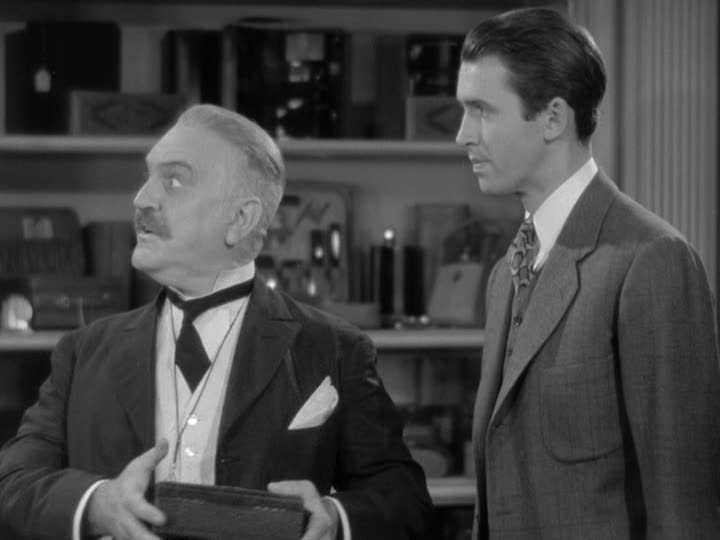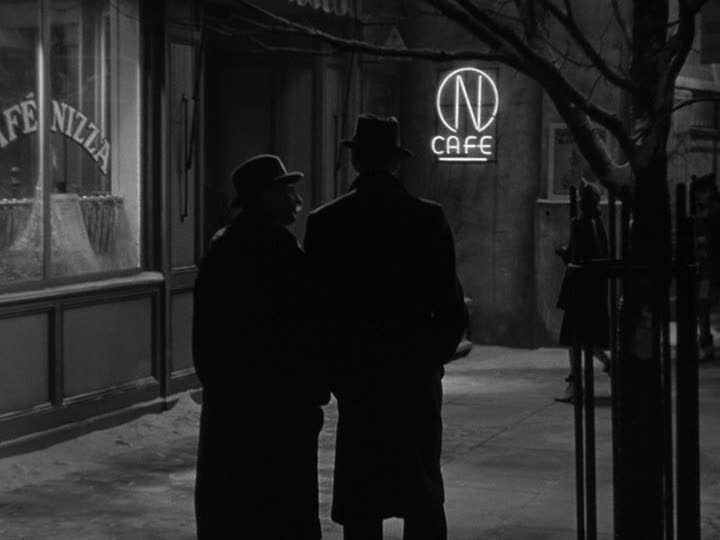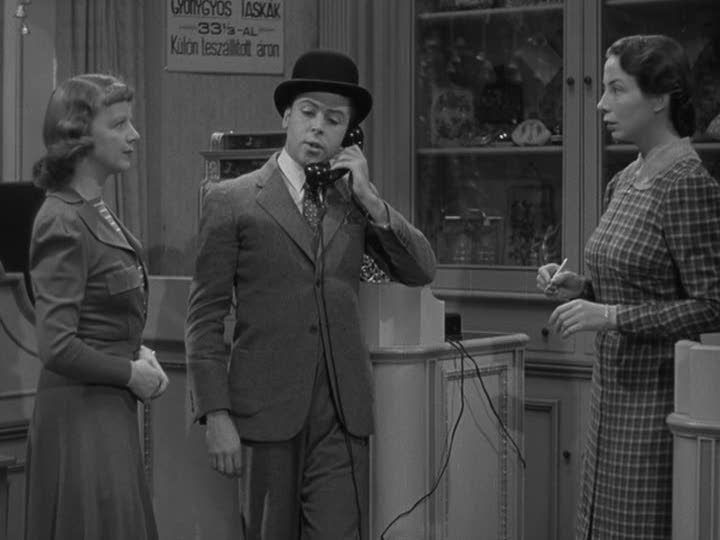
Ernst Lubitsch's The Shop Around the Corner is a rich, moving love story, a very warm film despite its snowy Christmastime setting. Although the film is focused on the antagonism of the store manager Kralik (James Stewart) and new employee Klara (Margaret Sullivan) — and of course, their eventual and inevitable realization of love for one another — in many ways it's more about everything that happens around this slowly developing romance. The film is set in a small shop in Budapest, and the texture of this shop, the daily business of the workers who gather outside every day for friendly chit-chat, is the real matter of the film. The characters are well-defined but not quirky, with just hints of low-key exaggeration lending some humorous edge to the anxious, sputtering Pirovitch (Felix Bressart) and the smart-alecky errand boy Pepi (William Tracy), who really comes into his own with a chest-swelled swagger when he gets promoted to salesman. The film's humor is gentle and quiet, with not a hint of mean-spirited mockery except, perhaps, in its portrayal of Kralik's foppish rival Vadas (Joseph Schildkraut). The film continually belies the idea that humor must be edgy or aggressive in order to be genuinely funny, as Lubitsch earns smiles, chuckles and occasionally even full-throated guffaws from his careful development of these characters and their minor foibles.
What's especially striking about the film's humor is the vein of real, deep sadness that runs through the center of it. There's a sense of loneliness in both Kralik and Karla, who separately believe they've found love in the form of someone they've never even met face-to-face, someone they've only corresponded with through letters. There's more than a hint of desperation in both characters: they invest so much into their romance-by-pen, as though it represents the last chance they each have for happiness or romance. In the process, they don't realize that the object of their love is right in front of them every day, that their relationship consists of sparring angrily by day and writing loving, romantic letters to one another by night. As such, the film is about the ideal of love as contrasted against the more prosaic but also more tangible reality: it's telling that before Kralik can reveal himself to Karla, he must adjust her expectations downward by shattering the fantasy of the letters, preparing her not only for the revelation that he's her great love, but that her great love is only a flesh-and-blood man after all. Lubitsch also has a wonderful feel for the anxieties of money, for the pressures of the working class life and the fear of losing a job, and the film makes great use of the Christmas setting for its subtle commentary on consumerism and salesmanship. It's a beautiful, funny, emotionally complex masterpiece with so much heart, so much beauty, in every image and every line that, despite its modest, unassuming surface, it winds up being an almost overwhelming experience.

















Ed, a tremendous write-up on a personal favorite of mine, as well. That final sentence of yours really sums it up, doesn't it:
ReplyDelete"It's a beautiful, funny, emotionally complex masterpiece with so much heart, so much beauty, in every image and every line that, despite its modest, unassuming surface, it winds up being an almost overwhelming experience."
I've always loved David Thomson's writing on the film, too. In his Biograhical Dictionary, Thomson wirtes, "The cafe conversation may be the best meeting in American film." In this same pice he also says, "THE SHOP AROUND THE CORNER may be as sweet and light as an Esterhazy honey ball - whatever that is - but it is also among the greatest of films."
Thanks, Jeffrey. This film really gets to me, it's so sweet and sad and beautiful, with so many emotional layers built into it. I like that Thomson quote too. It's a deceptively simple film, and as a result its powerful effect kind of sneaks up on the viewer.
ReplyDeleteA great movie, probably my favorite Lubitsch though I suppose that's an unusual thing to say. Some very poignant and true observations and I especially liked this: "preparing her not only for the revelation that he's her great love, but that her great love is only a flesh-and-blood man after all."
ReplyDeleteI always felt (and recently had the opportunity to highlight) that this & The Mortal Storm would make a sad and powerful double feature, what with Stewart/Sullavan/Morgan in the cast and the European setting, and their being released the same year.
Thanks for acknowledging this film. Joel, it's probably also my favourite Lubitsch, although I haven't seen them all. I also like "Heaven Can Wait", for different reasons (including the beautiful colour cinemtography), but the acting in Shop Around the Corner is a lot better, to me - seems far more natural.
ReplyDeleteI always like seeing Frank Morgan too, and I think he's great in this film.
I haven't seen much of Lubitsch's films but this one is also a film I love deeply. Lubitsch's films are simple but so effective and rich in the same time. He proves himself to be one of the greatest filmmakers and a reference in what Cinema is.
ReplyDeleteJoel, it's my favorite Lubitsch too, I don't know if that's so unusual. I haven't seen The Mortal Storm, but it sounds like I should.
ReplyDeleteBugsy, "natural" is a good description of this film, in terms of acting and everything else. It feels very grounded in real relationships, real problems.
Michael, I couldn't agree more. I too need to see more of Lubitsch's work but the few I've seen definitely confirm that he's one of the best.
"I am so sorry about last night"
ReplyDeleteA great piece as always, Ed - I keep reading your reviews and failing to comment, but will do so this time. This is a favourite film of mine too, and I really like your point about the contrast between the "ideal" of romantic love and the way that real love is built through the couple's everyday life.
ReplyDeleteYou don't mention Frank Morgan's character, but the still you have chosen of him bracing himself against the snow seems to sum him up. Morgan brings out the poignancy of the overbearing boss, and the relationship between him and surrogate son James Stewart is brilliantly done.
I think one reason for the mood of sadness in this film, with all its humour, is the feeling that the kinds of close-knit European communities so lovingly evoked here were being destroyed by the war. This ties in with Joel's comment about the film's connection with Borzage's 'The Mortal Storm', which almost feels like a tragic sequel to Lubitsch's comedy. Lubitsch also at once celebrates and mourns traditional European communities in his earlier drama 'Broken Lullaby', which looks at the lasting impact of the First World War on a small German town - and this film also features a surrogate father and son. I also need to see more Lubitsch!
Frank Morgan's greatness never fails to take my breath away. For Zillions of movielover he is and always will be "The Great and Powerful Oz." But just as that character was a mere mortal his shopowner in this film is painfully so. When the teriffic William Tracy saves him from suicide a tone of compassiona dn understanding is captured that's rarely found in films of any kind.
ReplyDeleteThe Shop Around the Corner is also a sterling example of James Stewart's uncanny cinematic power. It's a mixture of seemingly simple charm with sharp knowlingness udnerneath that will reoccur across the course of his career in films as different as The Philadelphia Sory, Bend of the River, Bell Book and Candle and of course Vertigo.
+1 Judy
ReplyDeleteAnd David's right about Morgan; his most famous role is not at all inconsistent with his screen persona in films like this & Storm.
And he's wonderful in Hallelujah I'm A Bum too.
ReplyDeleteLate to the party, but I will certainly join in with the accolades for this review and for the film, which is my personal favorite Lubitsch, even over the likes of TROUBLE IN PARADISE, TO BE OR NOT TO BE and the musical cycle. Sparkling dialogue, and irresistibly entertaining story and those great performances by Stewart and Sullavan are all snug under the umbrella known as the Lubitsch Touch. I completely agree there is a vein of melancholy running beneath the surface here.
ReplyDeleteJudy, I'm glad you brought up Frank Morgan since I didn't; the whole cast is uniformly excellent and he's no exception. You're also right that the film has a mood of eulogy, a sense of nostalgia, as though it's documenting a type of community that's, if not already gone at the time the movie was being made, then certainly on its way out.
ReplyDeleteDavid, Stewart is one of the greats for sure. He could always be so seemingly simple on the surface - at least before his more overtly dark later roles - but with real deep wells of feeling infused into every moment of his performances.
Sam, glad to see another for whom this is a favorite, not that it's any surprise. It's a real gem.
Bock and Harnick's She Loves Me (one of the greatest of all non-Sondheim musicals) isn't the only song-and-dance adaptation of Tne Shop Around the Corner. There's also In The Good Old Summertime which is set in a music store and stars Judy Garland and Van Johnson as the squabbling co-workers who are secret pen pals. Directed by Robert Z. Leonard it's overall pretty standard metro but it contains My All-Time Favorite Judy Garland number
ReplyDeleteLike several Lubitsch movies (Forbidden Paradise, Trouble in Paradise, Ninotchka, Angel, Heaven Can Wait, A Royal Scandal), The Shop around the Corner is an adaptation of an Hungarian play. Much has been written about the director's love for Budapest and his affinities with the booming theater, cafe and party culture of the town right after the first World War. However, one must not forget that the Hungarian theater scene in the thirties was totally intricated both with Broadway and Hollywood.
ReplyDeleteThe Pesti Színház where László Miklós' The Perfume Shop ('Illatszertár') was premiered in 1937, was an annex of the Vígszínház, whose owner since the twenties was a Paramount executive. Not only were many hungarian plays sold to the United States for adaptation the same year they were presented on stage, but many of the Hollywood films made after them quickly crossed the Atlantic back, were big hits in Budapest movie theaters - and in return, influenced many playwrights.
Thus, in spite of the carefully crafted film sets, The Shop around the Corner does not actually attempts to take place in the actual Budapest, nor does the film (and for that matter, the play) even slightly evokes the political context of Central Europe. The exotic location is pure fictional material, a fairytale setting : "Once upon a time in Budapest"...
Yet, there are undoubtedly unusually tender and nostalgic overtones in The Shop. My guess is they are entirely due to the auteur's own biography. Lubitsch's father owned a clothes shop in Berlin, and the young Ernst had been a clerk for a while. How far was the middle-aged director, in 1937, from the world of his youth, at the top of his Hollywood success ? This is the only Lubitsch movie set in the urban middle class, to which it is a graceful and very moving tribute, from a prodigal son that never returned.
Although there is no mean mockery, no rough sex, no high-flyers nor masters (or mistresses) of deception, no outrageous comic effects, it remains a proud example of the director's work. In particular, Kralik's character is pure Lubitsch : a man who meticulously crafts the road to his pleasure. The lengths of patience and skills he resorts to, in order to have Miss Novak fall for him entirely (accepting both the writer of the letters and the salesman), shows he is on par with the fiercest Lubitsch charmers - something which definitely kicks the movie out of the mawkishness orbit all the other adaptations of the same play have unfortunately remained stuck to. Oh, the genius of James Stewart !
Great comment, nem (saw this via email updates). I love the context you provide which puts the film even more into "bittersweet" mode in my mind.
ReplyDeleteAnd Stewart, goddamn - just watched Rope last night and the way the situation dawns on him, slowly and horribly, is absolutely brilliant reflected in his expression.